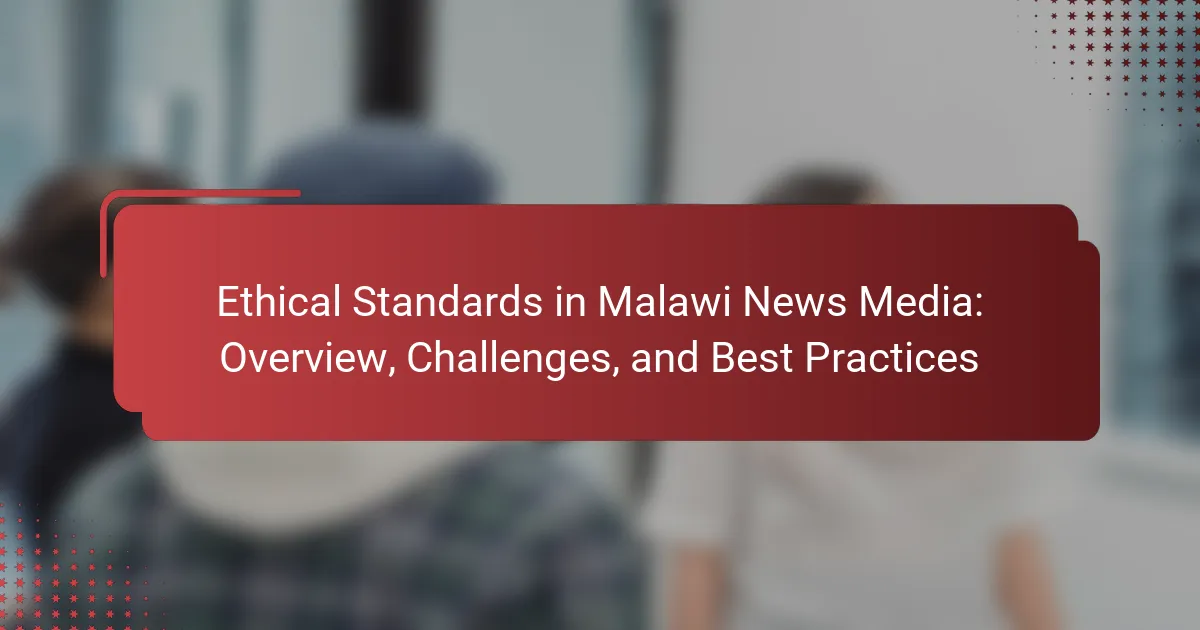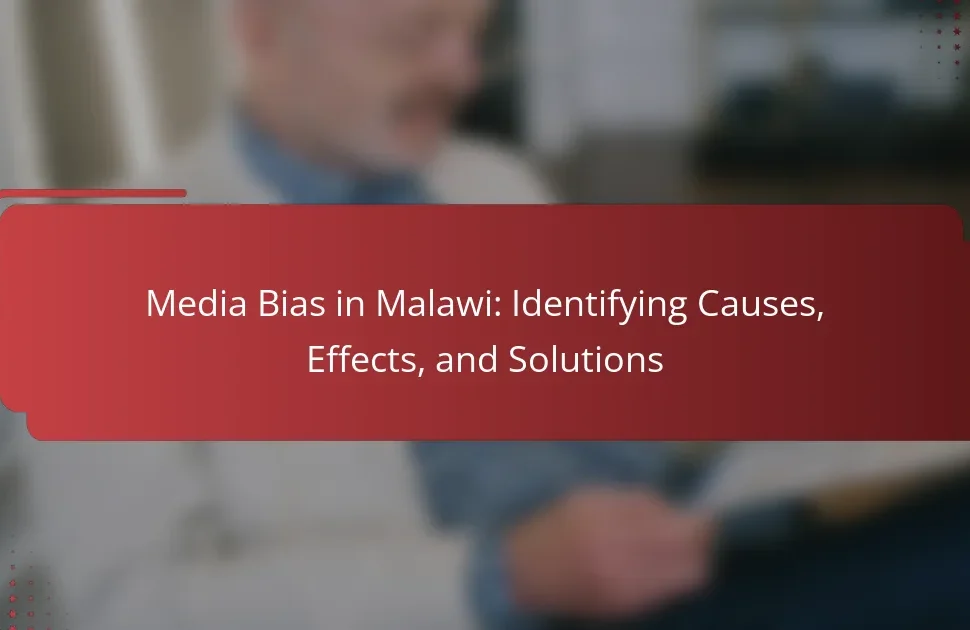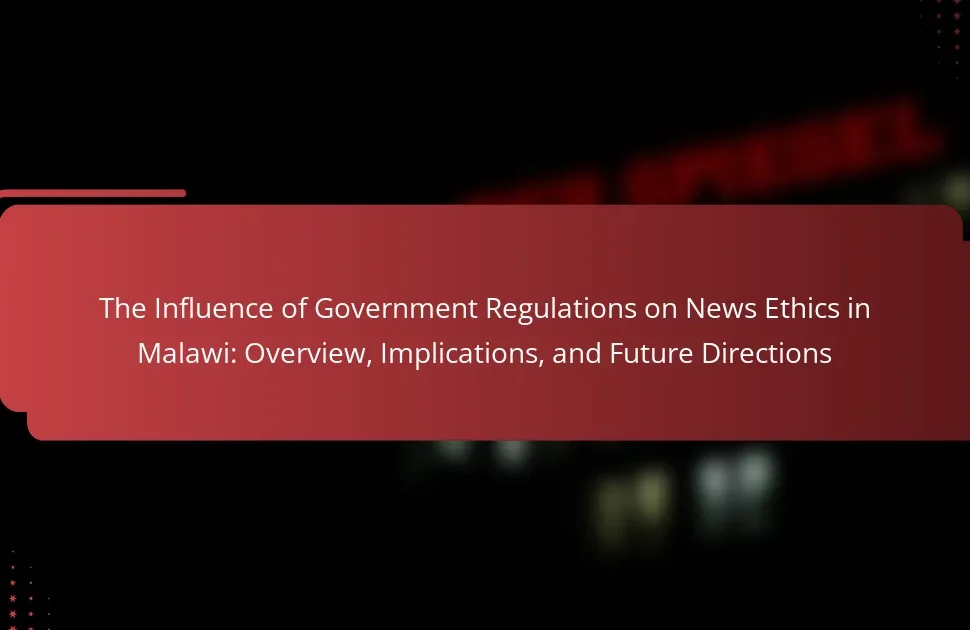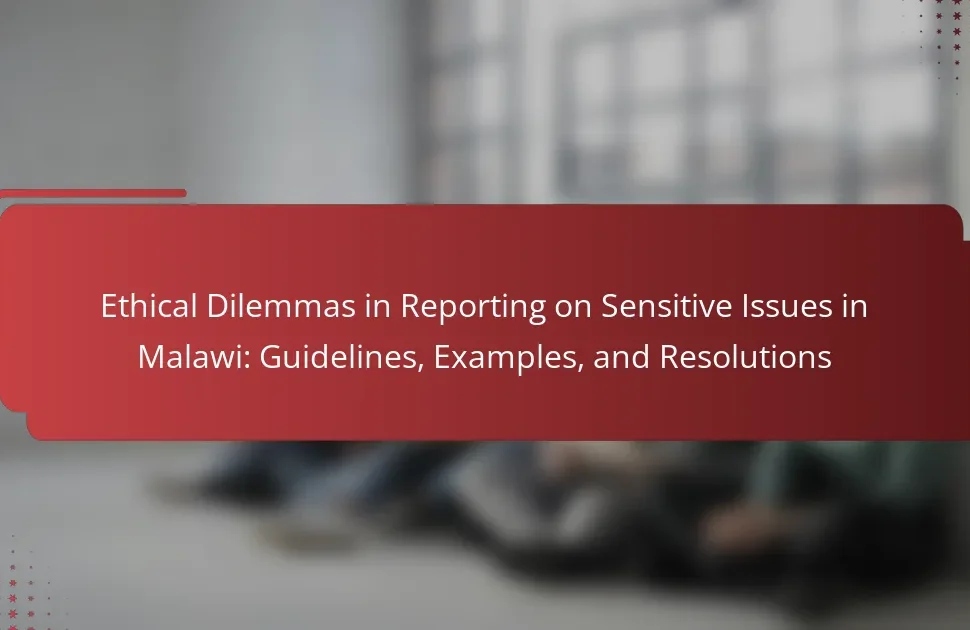The article examines the ethical standards governing news media in Malawi, highlighting the principles of accuracy, fairness, and accountability. It outlines the role of the Media Council of Malawi in providing a code of ethics that promotes impartiality and objectivity in reporting. The article also addresses the challenges faced by journalists, including limited resources, political pressure, and a lack of training in ethical practices, which can lead to biased reporting. Furthermore, it discusses best practices for improving ethical standards, such as implementing comprehensive training programs, establishing independent regulatory bodies, and enhancing transparency in media ownership. These measures aim to strengthen journalistic integrity and foster public trust in the media landscape of Malawi.
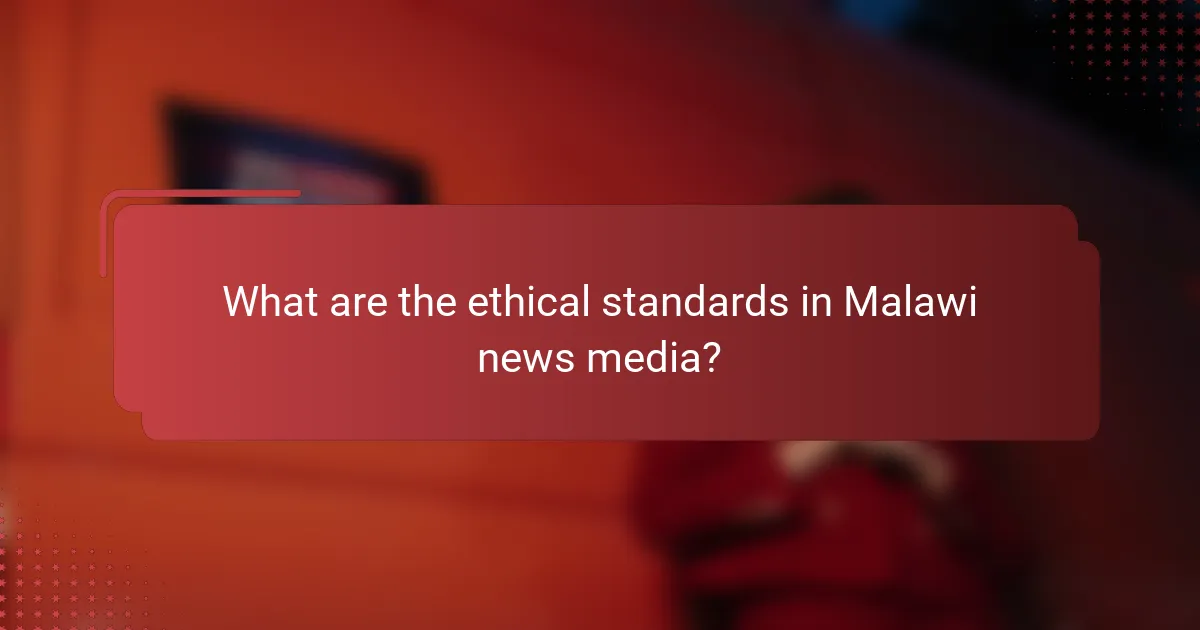
What are the ethical standards in Malawi news media?
The ethical standards in Malawi news media focus on accuracy, fairness, and accountability. Journalists are expected to report truthfully and avoid misinformation. They must respect privacy and refrain from sensationalism. The Media Council of Malawi provides a code of ethics guiding these standards. This code emphasizes the need for impartiality and objectivity in reporting. Adherence to these standards fosters public trust in the media. Violations can lead to disciplinary actions from the Media Council. These ethical guidelines are crucial for maintaining journalistic integrity in Malawi.
How are these ethical standards defined and implemented?
Ethical standards in Malawi news media are defined through established guidelines and codes of conduct. These guidelines are often created by professional associations and regulatory bodies. Implementation occurs through training programs for journalists and media practitioners. Regular workshops and seminars help reinforce these standards. Monitoring and evaluation mechanisms assess adherence to ethical practices. Violations may lead to disciplinary actions or sanctions. Stakeholder involvement, including public feedback, enhances accountability. Research indicates that adherence to these standards improves public trust in the media.
What organizations oversee ethical standards in Malawi news media?
The organizations that oversee ethical standards in Malawi news media include the Malawi Communications Regulatory Authority (MACRA) and the Media Council of Malawi. MACRA regulates broadcasting and telecommunications, ensuring compliance with ethical standards. The Media Council of Malawi promotes ethical journalism and addresses complaints against media practitioners. Both organizations play crucial roles in maintaining journalistic integrity in the country.
What guidelines are followed by journalists in Malawi?
Journalists in Malawi follow guidelines that emphasize accuracy, fairness, and accountability. The Malawi Journalists Association (MJA) promotes a code of ethics for its members. This code includes principles like truthfulness, respect for privacy, and the avoidance of sensationalism. Journalists are encouraged to provide balanced reporting and to verify information before publication. They must also respect the rights of individuals and communities. The guidelines aim to enhance public trust in the media. Adherence to these standards is crucial for maintaining journalistic integrity in Malawi.
Why are ethical standards important in news media?
Ethical standards are crucial in news media to ensure accuracy, fairness, and accountability. They guide journalists in reporting truthfully and responsibly. Adhering to these standards builds public trust in media organizations. Without ethical guidelines, misinformation can spread rapidly. This can lead to public harm and a misinformed society. Historical instances, such as the coverage of the Iraq War, highlight the consequences of unethical reporting. Ethical standards also promote diversity and representation in news coverage. They help protect the rights and dignity of individuals involved in news stories. Overall, ethical standards are essential for maintaining the integrity of journalism.
How do ethical standards impact public trust in journalism?
Ethical standards significantly enhance public trust in journalism. When journalists adhere to ethical guidelines, they demonstrate commitment to accuracy, fairness, and transparency. This fosters credibility among the audience. A study by the Pew Research Center found that 67% of Americans believe that ethical journalism is essential for trust. Ethical practices, such as fact-checking and sourcing, reduce misinformation. Consequently, a strong ethical foundation leads to increased audience confidence. In Malawi, ethical standards can help combat skepticism towards media outlets. Trust in journalism is crucial for informed public discourse and democracy.
What role do ethical standards play in promoting responsible reporting?
Ethical standards play a crucial role in promoting responsible reporting. They establish guidelines for journalists to ensure accuracy, fairness, and integrity in their work. Adhering to these standards helps prevent misinformation and bias in news coverage. For example, the Malawi Communications Regulatory Authority emphasizes the importance of truthfulness and accountability in journalism. This fosters public trust in the media. Ethical standards also protect vulnerable populations by encouraging sensitivity in reporting. When journalists follow these guidelines, they contribute to a more informed society. Thus, ethical standards are essential for maintaining the credibility and reliability of news media.

What challenges do Malawi news media face in upholding ethical standards?
Malawi news media face several challenges in upholding ethical standards. Limited resources hinder investigative journalism and fact-checking. Journalists often work under pressure from political and economic influences. This pressure can lead to biased reporting and self-censorship. Additionally, a lack of training in ethics among journalists contributes to the problem. The legal environment can also stifle freedom of expression, impacting media independence. According to the Media Institute of Southern Africa, harassment of journalists remains a significant issue. These factors collectively challenge the integrity of news reporting in Malawi.
What are the common ethical dilemmas encountered by journalists?
Journalists commonly encounter ethical dilemmas such as conflicts of interest, accuracy versus sensationalism, and privacy invasion. Conflicts of interest arise when personal interests may compromise reporting integrity. Accuracy versus sensationalism presents a challenge when the pursuit of engaging stories conflicts with factual reporting. Privacy invasion occurs when journalists must balance the public’s right to know with individuals’ rights to privacy. Other dilemmas include the use of anonymous sources and the potential for bias in reporting. These ethical challenges are critical in maintaining journalistic credibility and public trust.
How do political pressures affect journalistic integrity in Malawi?
Political pressures significantly undermine journalistic integrity in Malawi. Journalists often face intimidation and censorship from government officials. This pressure leads to self-censorship, where reporters avoid covering sensitive topics. As a result, the public receives biased or incomplete information. A 2021 report by the Media Institute of Southern Africa highlighted instances of journalists being harassed for critical reporting. The lack of legal protections further exacerbates these issues. Consequently, the overall trust in media diminishes, impacting democratic discourse.
What is the impact of financial constraints on ethical reporting?
Financial constraints significantly hinder ethical reporting. Limited resources often lead to reduced investigative journalism and reliance on less credible sources. Journalists may prioritize speed over accuracy due to time pressures. This compromises the quality of information presented to the public. Furthermore, financial limitations can create conflicts of interest. Media outlets may avoid reporting on issues that could alienate advertisers or sponsors. A study by the International Press Institute found that financial instability directly correlates with decreased journalistic integrity. Ethical standards suffer when news organizations are forced to cut corners to survive financially.
How does the lack of training influence ethical standards?
The lack of training significantly undermines ethical standards in the news media. Without proper training, journalists may lack the knowledge of ethical guidelines. This absence can lead to misinformation and biased reporting. Untrained journalists may not recognize conflicts of interest. They might also fail to understand the importance of fact-checking. In Malawi, this has been observed in various media outlets. Reports indicate that untrained journalists often misrepresent facts. This misrepresentation can erode public trust in the media. Ethical standards are crucial for maintaining credibility in journalism.
What training programs are available for journalists in Malawi?
Various training programs are available for journalists in Malawi. These include workshops organized by the Malawi Institute of Journalism. The institute offers diploma courses in journalism and media studies. Additionally, the Media Council of Malawi conducts training sessions focused on ethical reporting. Organizations like the International Press Institute also provide resources and training for media professionals. These programs aim to enhance journalistic skills and uphold ethical standards in news reporting.
How can improved training enhance adherence to ethical standards?
Improved training can enhance adherence to ethical standards by providing journalists with the necessary knowledge and skills. Training programs can focus on the principles of ethical journalism, including accuracy, fairness, and accountability. These programs can also include case studies that illustrate the consequences of unethical behavior.
Furthermore, ongoing training can reinforce the importance of ethical standards in daily reporting. Research shows that regular workshops can lead to a measurable increase in ethical decision-making among journalists. A study by the Ethical Journalism Network found that training significantly reduces instances of plagiarism and misinformation.
By equipping journalists with tools and frameworks for ethical reasoning, improved training fosters a culture of integrity within news organizations. This ultimately leads to higher public trust in the media and better quality reporting.
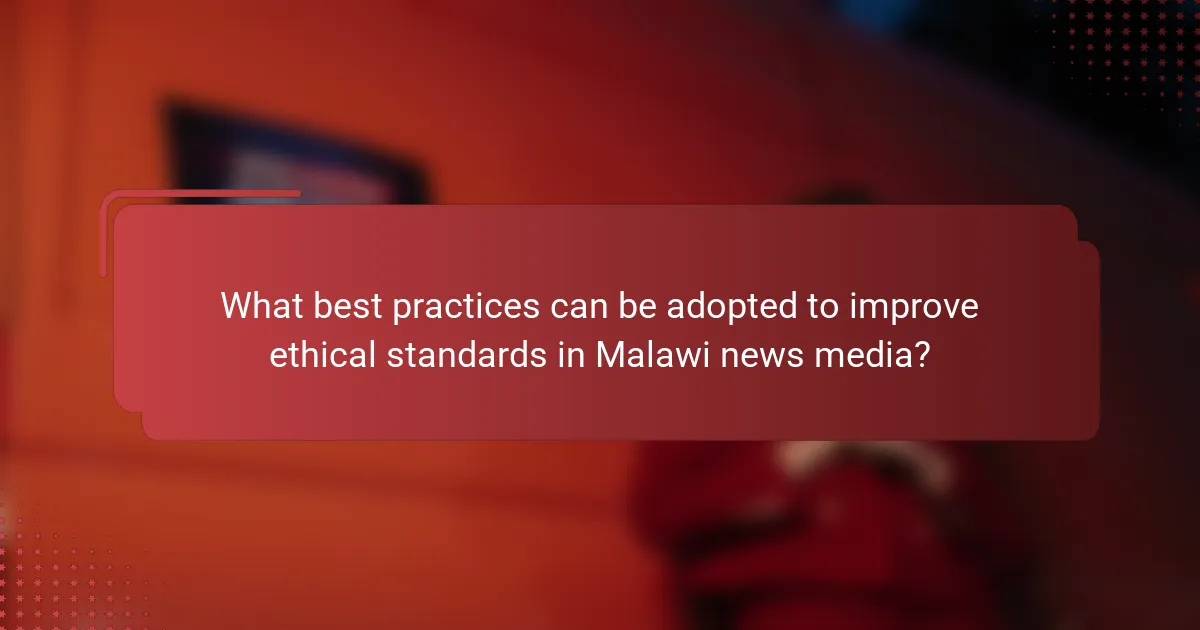
What best practices can be adopted to improve ethical standards in Malawi news media?
Adopting best practices to improve ethical standards in Malawi news media includes implementing a robust code of ethics. This code should be developed collaboratively with media professionals and stakeholders. Training programs on ethical journalism are essential for reporters and editors. These programs should cover issues like accuracy, fairness, and accountability.
Establishing independent regulatory bodies can help monitor compliance with ethical standards. These bodies should have the authority to investigate complaints against media outlets. Encouraging transparency in media ownership will also enhance accountability. Public awareness campaigns about media ethics can empower audiences to demand higher standards.
Collaboration with international media organizations can provide resources and best practices. Regular assessments of media practices can identify areas for improvement. These measures collectively contribute to a more ethical media landscape in Malawi.
What strategies can journalists implement to uphold ethical standards?
Journalists can implement several strategies to uphold ethical standards. First, they should adhere to a code of ethics. This code guides their reporting practices and decision-making. Second, journalists must ensure accuracy in their reporting. Fact-checking information before publication is essential. Third, transparency is crucial. Journalists should disclose sources and potential conflicts of interest. Fourth, they should seek to minimize harm. This involves considering the impact of their reporting on individuals and communities. Fifth, continuous education and training are vital. Regular workshops can help journalists stay updated on ethical practices. Finally, fostering accountability within the newsroom is important. Encouraging peer reviews can enhance ethical compliance. These strategies collectively contribute to maintaining high ethical standards in journalism.
How can transparency and accountability be promoted in news reporting?
Transparency and accountability in news reporting can be promoted through several key practices. Implementing strict editorial guidelines ensures that journalists adhere to ethical standards. Training programs for journalists can enhance their understanding of transparency. Encouraging the disclosure of sources fosters trust between reporters and the public. Regular audits of news organizations can help maintain accountability. Engaging with the audience through feedback mechanisms allows for public scrutiny. Collaborating with independent fact-checking organizations enhances the credibility of reported information. Research shows that news outlets with transparent practices build stronger relationships with their audience, leading to increased trust.
What role does community engagement play in ethical journalism?
Community engagement is essential in ethical journalism as it fosters trust and accountability. Engaging with the community allows journalists to understand local issues and perspectives. This understanding leads to more accurate and representative reporting. Ethical journalism thrives on transparency, and community involvement enhances this aspect. Studies show that news organizations with strong community ties report higher audience trust levels. Furthermore, community engagement can help identify and address biases in reporting. In Malawi, ethical journalism practices benefit from active community participation, ensuring diverse voices are heard. Thus, community engagement is a cornerstone of ethical journalism, promoting integrity and public trust.
How can media organizations support ethical practices among their staff?
Media organizations can support ethical practices among their staff by implementing comprehensive training programs. These programs should focus on ethical journalism standards and the importance of integrity. Regular workshops can reinforce these principles and provide updates on ethical dilemmas. Establishing a clear code of ethics is essential for guiding staff behavior. Media organizations should also promote open discussions about ethical issues in the newsroom. Encouraging whistleblowing without fear of retaliation fosters a culture of accountability. Providing resources for ethical decision-making can help staff navigate complex situations. Monitoring and evaluating adherence to ethical standards is crucial for continuous improvement.
What policies can be established to foster a culture of ethics in newsrooms?
Establishing clear ethical guidelines is essential to foster a culture of ethics in newsrooms. These guidelines should outline acceptable behaviors and decision-making processes. Training programs on ethics should be mandatory for all staff members. Regular workshops can reinforce the importance of ethical journalism. Implementing a system for reporting unethical behavior is crucial. This system should ensure confidentiality and protection for whistleblowers. Encouraging open discussions about ethical dilemmas can promote a culture of transparency. Leadership should model ethical behavior to set a standard for all employees. Regular evaluations of ethical practices can help maintain high standards in journalism.
How can mentorship programs aid in ethical journalism practices?
Mentorship programs can significantly enhance ethical journalism practices. They provide guidance from experienced journalists to novices. This relationship fosters a deeper understanding of ethical standards. Mentors can share real-world examples of ethical dilemmas. This practical insight helps mentees navigate complex situations. Additionally, mentorship encourages accountability in reporting. Regular feedback from mentors reinforces ethical decision-making. Studies show that mentorship improves journalistic integrity and professionalism. For instance, a report by the International Journal of Press/Politics highlights the positive impact of mentorship on ethical practices in journalism.
What are some practical tips for journalists to ensure ethical reporting?
Journalists can ensure ethical reporting by adhering to several key practices. First, they should verify facts before publication. Cross-checking information with reliable sources helps maintain accuracy. Second, journalists must respect privacy and avoid unnecessary intrusion into individuals’ lives. This is essential for ethical considerations. Third, they should disclose conflicts of interest. Transparency builds trust with the audience. Fourth, journalists must strive for impartiality. Presenting multiple viewpoints fosters balanced reporting. Fifth, they should avoid sensationalism. Reporting should focus on facts rather than exaggeration. Lastly, continuous education about ethical standards is crucial. Staying informed about evolving guidelines enhances journalistic integrity. These practices are supported by the principles outlined in the Society of Professional Journalists’ Code of Ethics.
How can journalists effectively fact-check their sources?
Journalists can effectively fact-check their sources by verifying information against multiple reliable sources. They should cross-reference facts with established databases and reputable organizations. Utilizing fact-checking websites can provide additional verification. Journalists should also assess the credibility of the source by examining their expertise and history. It is crucial to analyze the context of the information presented. Engaging with subject matter experts can clarify complex topics. Maintaining an organized system for tracking source information enhances accuracy. Regular training on fact-checking techniques improves overall journalistic integrity.
What steps should be taken to avoid conflicts of interest in reporting?
To avoid conflicts of interest in reporting, journalists should disclose any personal or financial interests related to their stories. Transparency helps maintain trust with the audience. They should also adhere to a strict code of ethics that prohibits accepting gifts or favors from sources. Regular training on ethics can reinforce these standards. Establishing an editorial review process can help identify potential conflicts before publication. Additionally, journalists should seek guidance from editors or ethics boards when in doubt. These practices are essential for upholding integrity in journalism.
The main entity of the article is the ethical standards in Malawi news media. This article provides an overview of the ethical guidelines that govern journalistic practices in Malawi, emphasizing accuracy, fairness, and accountability. It discusses how these standards are defined, implemented, and monitored by organizations like the Malawi Communications Regulatory Authority and the Media Council of Malawi. Additionally, the article addresses the challenges faced by journalists, such as political pressures and financial constraints, while outlining best practices and strategies to enhance ethical reporting in the media landscape.
